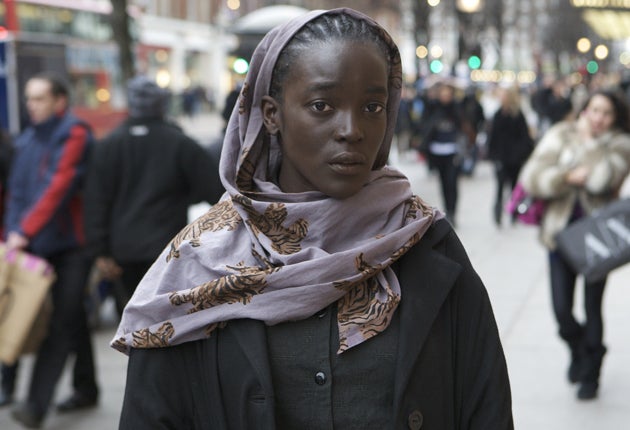Aiming for more than just a captive audience
A new drama about modern-day slavery is compelling, says Gerard Gilbert. But can TV shows really be catalysts for change?

At Bafta recently, at the premiere of a powerful new drama about a young Sudanese woman kept as a household slave in London, I shared an interesting experience.
I Am Slave, from the producer and co-writer of the Oscar-winning The Last King of Scotland, tells of a Sudanese girl who is kidnapped and forced into domestic servitude first in Khartoum, and then in London.
The film shows how 12-year-old Malia is snatched by Arab pro-government militias during a raid on her village in the Nuba Mountains, enslaved in Khartoum, and eventually trafficked to the UK where, aged 18, she becomes a household servant in north London. Home Office figures – most likely an underestimate – put the numbers of trafficking victims currently in slavery in this country at 5,000, but what makes I Am Slave so moving is the way it humanises that bald statistic. It is based on the real-life experiences of one Nuban woman called Mende Nazer.
So there I was at Bafta, being angered and moved by the plight of this young woman (expressively played by Wunmi Mosaku, in a performance that is largely mute), when, nearing the end, a small part of me was starting to disengage, to locate my briefcase in the dark and think about train times home. Here we all were, a predominantly (I assume) liberal audience, having our consciousnesses raised about this issue, and then we would leave the theatre, and all our emotions would dissipate into the night air, and... what? Are films like I Am Slave just a form of liberal masturbation?
And then bang on cue, the loud sobbing started in the row behind. We had reached the cathartic scene in the film where Malia is reunited with her long-lost father in Sudan and her wails were being answered from the seats behind me. For there sat the real Mende Nazer, who had just watched her story being told on the big screen.
"That was satisfying... to know that we had got it right," says producer Andrea Calderwood. But can such dramas make a real difference? "If you can get a million-plus people watching this on TV, the least it can do is help to raise awareness," she says. "Whenever I tell people that I'm working on a film about slavery in London, they all assume that it's set 200 years ago... "
Others are more sceptical. Mark Duguid from the British Film Institute cites Ken Loach's 1966 TV film about homelessness, Cathy Come Home. "The example that is always quoted is Cathy Come Home leading to the setting up of Shelter, which is rubbish," he says. "Shelter was launched a week or two later; it was already on the way. But we've still got homeless people. Ken Loach has said several times that drama can't change anything."
Tony Garnett produced Cathy Come Home, and has a long history of making campaigning dramas (although he doesn't like the term). For him, whatever the issues raised, it is the storytelling that should be paramount. "First of all, if it's not good drama then it's not worth making," he says. "The fact that it might be about something, or on the side of the angels, does not score you brownie points. That's not what art's about. Don't do drama, if that's what you want; write a pamphlet or get into politics."
"I tell you what the main result of Cathy Come Home was: there are probably more people homeless now than there were then, or in such appalling accommodation that they might as well be homeless, and the people who made the film have very nice places to live in."

Watch Apple TV+ free for 7 days
New subscribers only. £8.99/mo. after free trial. Plan auto-renews until cancelled

Watch Apple TV+ free for 7 days
New subscribers only. £8.99/mo. after free trial. Plan auto-renews until cancelled
"And yet Loach keeps making them," replies Calderwood. "He is a serious man and I don't think he'd waste his time if he didn't think it would make any difference. It's not that the film itself can change anything, but if it moves people to get into touch with an organisation like Anti-Slavery International – if just a few people who watch the film follow up and take action then that's a great thing."
'I Am Slave' is on Channel 4 tonight at 8.30pm
Subscribe to Independent Premium to bookmark this article
Want to bookmark your favourite articles and stories to read or reference later? Start your Independent Premium subscription today.

Join our commenting forum
Join thought-provoking conversations, follow other Independent readers and see their replies